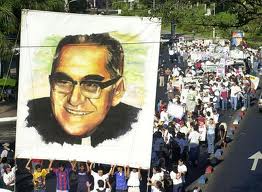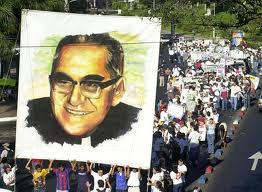In case you were wondering what Archbishop Romero had to confront over the last three years of his life here is a list of what he faced and sought to respond
- to pervasive and extreme poverty;
- to paramilitary killings of community leaders;
- to peasant massacres and the indiscriminate shooting of urban demonstrators by the security forces;
- to the torture and disappearance of political prisoners;
- to the decapitation and mutilation of death squad victims;
- to the assassination of six of his priests and dozens of catechists;
- to the deportation of foreign clergy;
- to the desecration of churches and their tabernacles;
- to the threat from the White Warriors Union to exterminate all the Jesuits in the country;
- to the bombings of the diocesan radio station and printing press;
- to the discovery of a suitcase of dynamite placed behind the altar at his Sunday Mass;
- to the corruption of the supreme court and the judiciary;
- to the suspension of habeas corpus and constitutional guarantees through a so-called ‘Law of Public Order’;
- to a military-civilian junta installed by military coup;
- to the kidnapping and execution by armed leftist groups of local and foreign businessmen, and of government ministers and public figures;
- to the occupations of churches, the cathedral, embassies and government ministries by popular movements;
- to conflictive and paralysing strikes;
- to continuous campaigns of slander and defamation in the press;
- and to death threats from both the right and the left.
As I read this it is no wonder so many, including Pope Francis , think this is the stuff of which saints are made. A saint for difficut times.
 Julian Filochowski provided this list in his presentation on Oscar Romero as a living witness of “Pacem in Terris”. He is the Chair of the Archbishop Romero Trust and included it during the Catholic Social Tradition Conference on ‘Peace Yesterday, Today and Tomorrow – Celebrating 50 Years Since Pacem in Terris’ at Notre Dame University in South Bend, Indiana on 23 March.
Julian Filochowski provided this list in his presentation on Oscar Romero as a living witness of “Pacem in Terris”. He is the Chair of the Archbishop Romero Trust and included it during the Catholic Social Tradition Conference on ‘Peace Yesterday, Today and Tomorrow – Celebrating 50 Years Since Pacem in Terris’ at Notre Dame University in South Bend, Indiana on 23 March.
He concluded his presentation…
Happily in 2010, Mauricio Funes, the current President of El Salvador offered an official apology to Romero’s family and the people of El Salvador for the complicity of the state in the magnicide and in the subsequent cover-up of what was no less than a crime against humanity.
I believe we must ask ourselves what remembering Archbishop Romero means and should mean today. The fundamental Christian model of remembering is ‘Do this in memory of me’. For the Church to remember Archbishop Romero must first mean to continue his work not only loving the poor but actually defending the poor; pursuing justice for the crucified peoples of our world; and taking risks for peace and the kingdom of God. And like him it means to struggle with all the paradoxes and conflicts that such a commitment throws up for us. Indeed he warned us in no uncertain terms: A Church that suffers no persecution but enjoys the privileges and support of the things of the earth – beware – it is not the true Church of Jesus Christ.
He has shown us all that the ‘preferential option for the poor’ is not just some meaningless rhetoric from the late 20th century. He lived it. And so he challenges us – and if we truly commit ourselves then the option for the poor is do-able, even for bishops!
With Archbishop Romero there was no “cleavage between faith and practice” – between his orthodoxy and his orthopraxis. The rhetoric of his preaching and teaching and his concomitant pastoral actions were absolutely coherent, consistent and mutually reinforcing. He talked the talk and he walked the walk. It is part of the key to his greatness.
As a pastor and as a church leader Archbishop Romero amassed colossal moral authority – which is still recognised today. At the present time the moral authority of the Church is much diminished. Nevertheless across the globe Oscar Romero is embraced with admiration, with affection and with pride as an icon of holiness, a model of a bishop and an heroic Christian witness for these troubled ecclesial times. He was utterly orthodox and utterly radical.
Romero was the enemy of cover-up and ‘spin’ which is today’s all-pervasive sin. He spoke the truth fearlessly, prophetically. We have too many ‘Nicodemus Christians’ today, bishops and lay people alike, afraid to speak the truth in public about contemporary controversies that affect the Church and the world. Romero’s road to martyrdom reminds us that maintaining the unity of the bishops’ conference is not a fundamental kingdom value; and saving the face of the hierarchy can never trump speaking the truth about the violation of human rights and securing justice for the abused and excluded.
Romero was a deeply spiritual man, with a rich prayer life; his example to us is the beautiful, and dare I say it, seamless synthesis he made in living and witnessing to faith and promoting peace with justice. An Apostle of Peace.
He is not a martyr because they killed him; they killed him because he was a martyr, a witness, a witness to the truth, a witness to the Magisterium of the Church, a witness to Vatican II, and indeed a witness to Pacem in Terris.
Even when they call us mad,
when they call us subversives and communists
and all the epithets they throw at us,
we know that we only preach
the subversive witness of the Beatitudes,
which have turned everything upside down
to proclaim blessed the poor,
blessed the thirsting for justice,
blessed the suffering,
blessed the peacemaker.
For more information on the University of Notre Dame see: http://www.nd.edu/
For more information on the Romero Trust, see: http://www.romerotrust.org.uk/
Tags: Pacem in Terris, Romero

